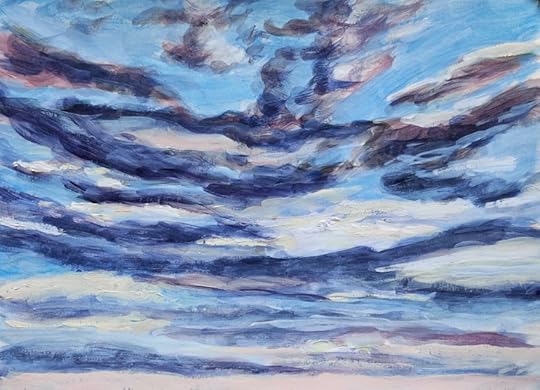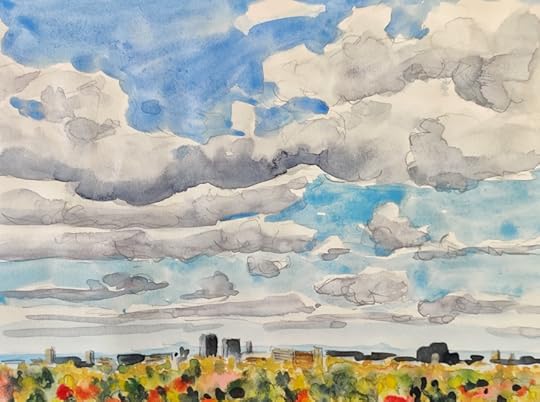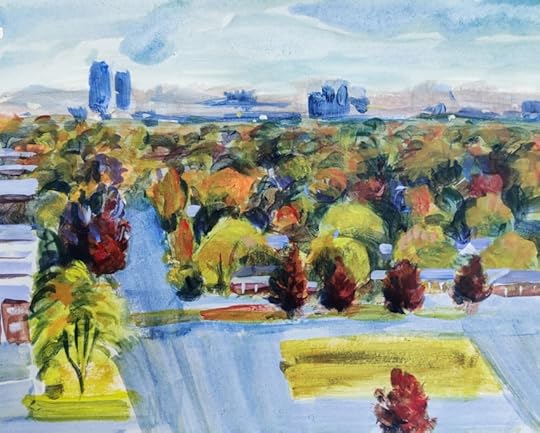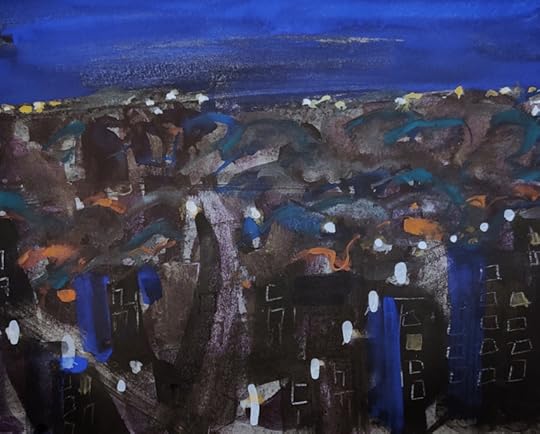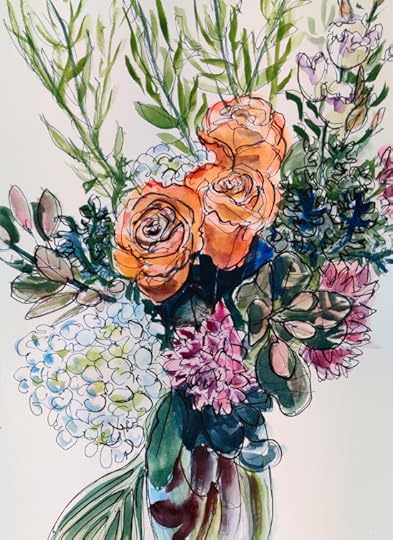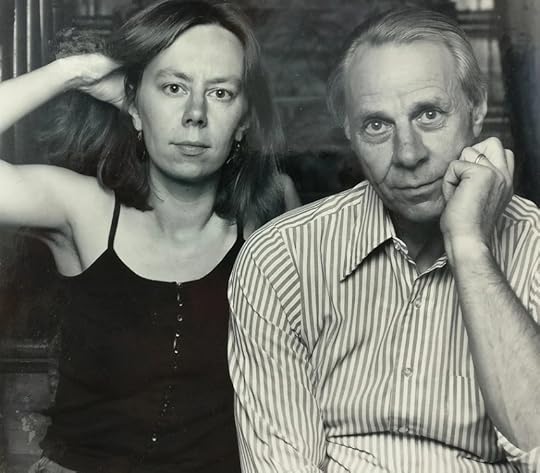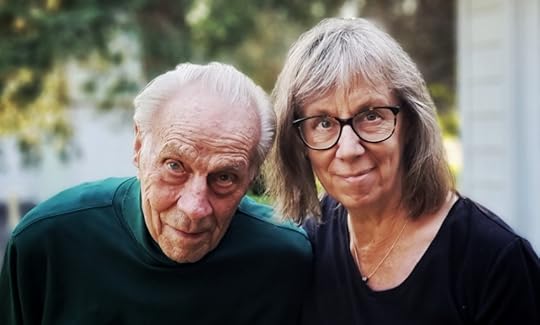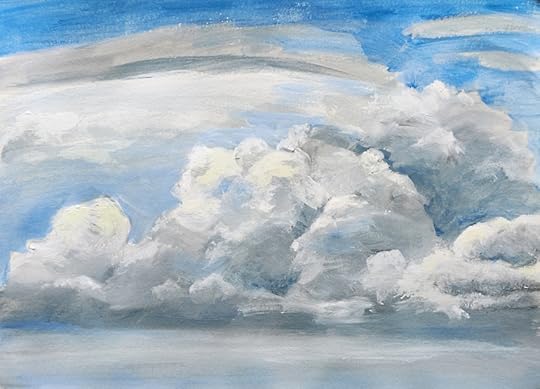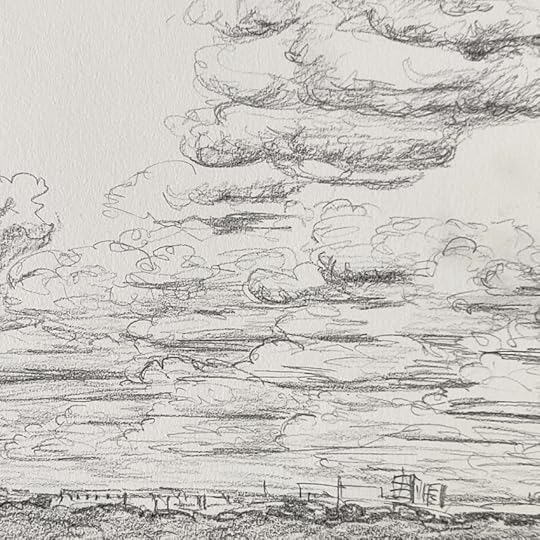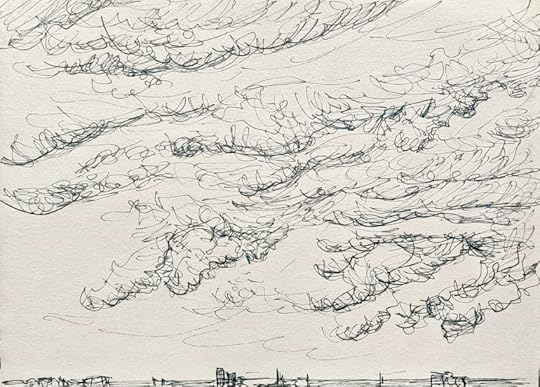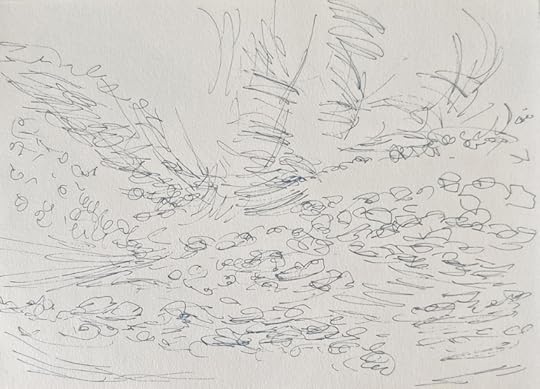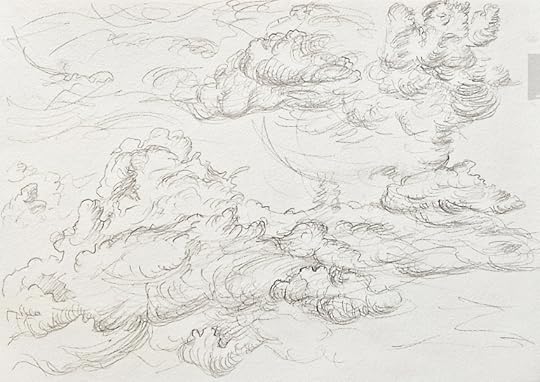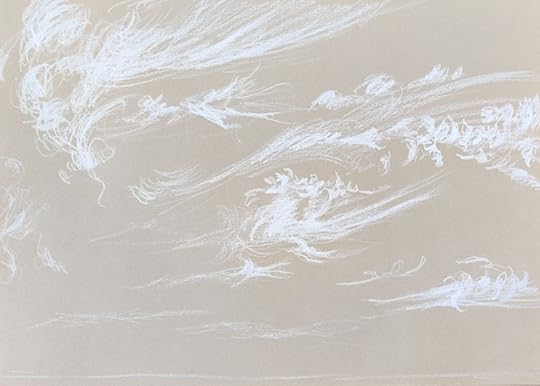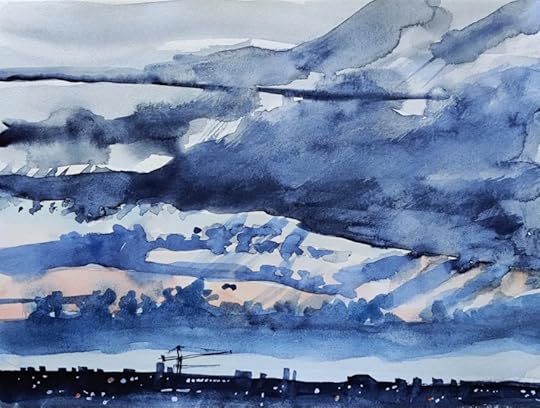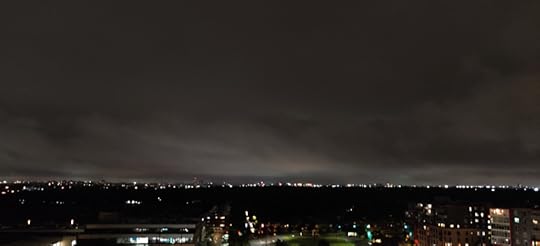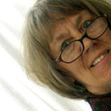Elizabeth Adams's Blog, page 12
November 16, 2022
Coming Up for Air
Almost sunset. Acrylic on sketchbook paper. 10/26/2022.
Well.
It's been quite a stretch of time since March: a house move, caring for my father in four different living situations, a studio move, my father's death and funeral, and a whole new set of responsibilities, all of which has taken place during a pandemic which -- for us -- continues to be a concern and a factor in many of our decisions. We returned from our latest trip to central New York on Sunday night, and for the first time in all of these months, there's no more moving to do: I have a little bit of free time and the chance to consider what I might want to do with myself.
So much has changed, and I have changed with it; this is not a simple matter of picking up where I left off, either last March, or before the pandemic began in 2020. When I ask myself, "What has not changed? What are you still passionate about?" the answers are easy: the people and creatures I love and care about; art; music; writing and reading; the natural world...and learning. But because of COVID, that "learning" component isn't going to include a lot of foreign travel. We are not ready to start traveling to the kind of destinations we used to, and we aren't going to be participating in large indoor group activities or crowds, or going to restaurants or parties with a lot of unfamiliar people. Pretty much everyone we know who has done these things has eventually gotten sick, and unfortunately we aren't in a position to risk that; even with all the vaccinations and boosters, there's no way to tell how the virus will affect an immuno-compromised person. We're using public transportation again, and going to certain kinds of gatherings; we do have people over here and have gone to friends' homes; and in good weather we did plenty of outdoor socializing -- and, luckily for all of us, that balmy weather stretched well into November.
The height of autumn. Watercolor in sketchbook. 10/9/22.
But last night it snowed in Montreal, and it's been snowing all day today. The stark fact, as I consider winter, is that society has moved on without us; we are like people with a disability, and it is up to us to figure out how to structure our lives in the new reality in which we find ourselves: how to combat isolation, deal with loss, find meaning and connection and purpose within certain limitations.
So the deficit side of the balance sheet includes limited travel; no longer singing in the choir, which was a huge part of my life; and some limitations on gatherings and events. I'm still dealing with grief, loss and change -- and I'm older. I may not feel it very much, but it's a fact.
In an undecided middle area are my publishing company, Phoenicia, and my involvement with social media, with the latter tipping decidedly toward less involvement rather than more, though I'll continue connecting with my creative community on Instagram.
Late fall view from my studio window. Acrylic on sketchbook paper. 10/20/22.
On the positive side is a greatly-improved, integrated living and work situation that's going to work a lot better for us. I have several unfinished projects begging for attention -- two book projects, and the body of drawings about Iceland that I began long ago and which is about 3/4 finished (more on these in a subsequent post.) My piano is finally in my home again, and there's good soundproofing here; I've been playing nearly every day and working on learning some new pieces of music. The piano is out of tune, but that's temporary, and maybe there will be new and different opportunities for making music with other people. The weekly online book group I helped organize back in 2020 is still going strong, and I've actually made a number of wonderful new online friends over the past couple of years, and a couple of new in-person friends too. Access to nature is greatly improved by the fact that I've inherited my father's house in a beautiful rural place, and though it's six hours away, we can go there when we want a change from the city.
City at night. watercolor and gouache on sketchbook paper. 10/13/22.
Finally, there is this blog, which has endured all sorts of personal, technological, and societal changes since it began in 2003. As a firm believer in owning and controlling one's own online content, I've no intention of letting it go, and instead, have been thinking about how to infuse it with more energy now that I have some time. Could it be more educational, more helpful? Could it help to launch new projects and bring people together, as it has in the past (quarrtsiluni, Phoenicia Publishing, online groups)? What else is there that I haven't considered? There's nothing wrong with social media functioning as a hub where interested people find content and go to it, but as our disillusionment with these social platforms and their capitalist agendas grow, could blogs regain some of their gravitas and a new sense of purpose? I wonder.
It depends somewhat on our expectations. I do know that I don't care about the number of followers or readers, and we are long since past those heady days where aspiring writers thought they'd become well-known through their blogs -- there's no way that someone steadily writing good but long-form posts would become famous like a seductive Instagram influencer, not in today's world! But careful and engaged readers and writers still do exist: Dave Bonta's weekly poetry blog digest bears witness to that. Blogs like Language Hat, Velveteen Rabbi, Hoarded Ordinaries, and Whiskey River have kept on quietly, steadily, thoughtfully posting for nearly two decades now, and there are many others. If these are not impressive and worthy bodies of creative work, I don't know what qualifies.
We can't tell what's ahead, as we've all found out, but we can certainly think about the present and what to do with it. I wonder how you are feeling right now, and what your insights are -- I'd be happy to hear from you in the comments.
November 3, 2022
The End of Autumn
I wrote a whole post earlier this week, and then Typepad went down due to a DDoS attack, and lost it. Now the platform is up again, but it's impossible to post any images because Typepad is having difficulty migrating to a new server.
The best news is that we finished the studio move on October 30 - the space is swept and empty, and we returned the keys. It's hard to believe that we're actually done. It was a good space for us for many, many years and I'm grateful for that.
Meanwhile, the leaves are coming off the trees and winter definitely approaches, even though we haven't had a major frost yet. We've usually had freezing weather by Halloween, but not this year -- in fact, it's supposed to be 68 degrees this weekend.
I began a new sketchbook in October, and so far it seems to be much more experimental than the previous one, perhaps as a result of the utter upheaval in my artistic life due to the studio move, that has made continuity next to impossible and perhaps not even desirable. I've been working in gouache and acrylic on paper, in addition to watercolor, and that feels good. But I hope to get back to some larger charcoal drawings and some paintings this winter. The new studio is quite small but efficient, and I think I'll be able to manage by working on one thing at a time rather than spreading out a bunch of stuff and leaving it there, just because of a surfeit of space.
Also, Instagram is troubling me these days. I spend too much time scrolling through my feed. I'm not sure if stepping away for a while is the right move, or sharply decreasing my time there, or simply cutting down the number of people I follow, but I do need to make some changes.
Let's hope the blog issues get resolved soon, but in the meantime, I'll try to write here a bit more often. I hope you are gracefully navigating the change of seasons where you live, if in fact you have a change -- it's never entirely easy. Always happy to hear from you in the comments, and with a bit more time now, I will try to reply!
October 21, 2022
Artists, Moving On
The deadline is October 31 at midnight; that's when our studio lease is up.
We're almost done. After a month of steady work, the furniture and equipment are gone, the files emptied, the tools sorted, the negatives and prints and artwork moved. Two days ago I sprayed my large charcoal drawings with fixative and took them off the walls - those were the last piece of our work remaining. The recycling/junk guys came yesterday and took away all the leftover books and a large wooden shelving unit. We have a small load remaining to bring home, another to take to storage (it is a small storage locker!), and another group of things, mostly tools, are going to the lake, but we can begin to imagine ourselves sweeping and mopping the floor, and turning the key in the lock for the last time.
What a saga. This move has been so much harder than downsizing and moving our household. There was simply a greater accumulation of things that we hadn't dealt with, and had to go through in detail, separating them into "keep", "sell", "give away", "recycle" and "throw away" - and then those categories ended up with finer subsections --for instance, things that we could take ourselves to the EcoCentre, like metal recycling, or hazardous waste, or the thrift store, or other things that were too bulky or impossible to dispose of -- like the many books that our bookseller friend didn't want, and friends and family didn't want, and even the thrift places and used bookstores didn't want.
The real issue, of course, wasn't just the arduous, lengthy, physically-demanding process, which simply had to be gone through, but the emotional aspects of sifting through forty years of our working lives and personal history, and preparing ourselves for the next chapter, which will not include a large space for whatever projects we decide to embark upon. For years I'd occasionally suggest that we sort through the boxes and accumulated stuff that we didn't seem to be using, but when you have plenty of space, there is such a dis-incentive to actually do that -- and we didn't. But as the rent rose higher and higher, the day of reckoning approached. We did a lot of weeding last summer, but signed one more lease, knowing that it would probably be the last one, but with no concrete plan for what was next except that we wanted to bring living and work under one roof again. In March, when we found a new place to live, that set the inevitable process in motion -- and the studio closing was forced upon us. When my father became dependent on our care, and then died, the available time for the moving process was contracted and the pressure became much greater.
It's been enlightening to see what we actually did keep over the years, and why, and what has changed now to allow us to let much of that go. I think we've learned a lot about ourselves and each other in this process, and I'm more inclined to be gentle as I look back at the people we were, rather than judging ourselves too harshly. When we started out together, as partners in marriage and a fledgling business, we had nothing, and were determined to be self-sufficient -- so of course we gradually acquired tools and supplies for every conceivable task. We bought a house that needed a great deal of work, and we did almost all of it all ourselves, from the heating in the cellar to raking the roof in the winter to prevent ice dams; my husband sanded and painted every clapboard; I grew a lot of our food, made curtains and clothing, papered and painted and sanded; he took care of the car and built furniture for us in his small woodshop; he learned how to do plumbing and electricity and tiling. We bought and mastered each new generation of computer equipment to keep our design and publishing business going without needing employees or technical assistance. This was at first a necessity, but became our way of life, and during those energetic years, we enjoyed it and took pride in it.
When we moved from a small, relatively rural Vermont village to Montreal, we really had no idea of what we were getting into, and what we might need or not - so we brought most of those tools and equipment with us. And we kept far too much in the way of outmoded tools and supplies. Our big error was not dealing with all of that during the intervening years and having to do it all at once -- but now we've done it, and we've gone through the paralyzing uncertainties about what to do, the decisions, the leave-takings, the questions about identity and age, and the sorting and packing and letting-go -- and we've survived. When October 31 comes, we will feel lighter, happier, and more free.
What I find most sobering is the plight of artists and craftspeople who still desperately need those large studio spaces, yet are being pushed out of one once-affordable but now-gentrified neighborhood after another. During the moving process, we've shared the freight elevator, loading dock and dumpster with many other tenants of this large former factory building, who can no longer afford the rent charged by the new landlords who are upgrading and changing the building into a place for small businesses, high-tech firms, and offices -- all of which can afford considerably higher rents. It is a business decision for the owners, and they have a right to do that; the building is much more attractive than when we moved in more than fifteen years ago. But as I've talked to others who are leaving, their anxiety and stress are palpable, and there are few good options for them in this city. And while a society without art is unbearable, and the governments everywhere tout their artists as intrinsic to the society's identity, very few actually give the necessary support. Relentless capitalism always wins.
Somehow, the arts and artists survive, but I ache for the people whose work and psychological health will suffer as a result of being forced into smaller, insufficient spaces. What do we care about and value, as human societies? Choosing art (and here I mean all the arts) as a way of life almost always means years of low income and precarity, but artists are not considered in the same breath as "the poor" - in fact, many people see them as somehow privileged, and governments tout them as shining examples of each culture. Except in rare circumstances, artists are not protected, and very few rise to acclaim or monetary success -- but just look at the people who use the work of artists, and their associations with them, to make themselves feel important and elite. Look at the system of grants and exhibitions and art sales, and who really profits from it -- a largely-closed system that has only been somewhat eroded by the freedom of the internet and artists taking control of their own distribution, marketing, and sales. When you look closely at the system, you see its unfairness and hypocrisy -- but the purity at the heart of art always remains, and can't be taken away. This is why, in spite of everything, it survives.
September 30, 2022
A Visual Diary
Sketchbook, July 2021-September 2022. (Best if viewed full screen, and you can click CC for some captions.)
It always strikes me, when I finish a sketchbook, how much like a diary it actually is. During this journey through a little more than a year -- a year that's seen a lot of upheaval and emotion and change -- the images and the choices recall exactly where I was and what I was thinking, while to the viewer, they probably look like innocuous still lives, landscapes and skyscapes. In some ways, this visual diary is more personal and secret and coded than written words could ever be.
On the other hand, I hope it's interesting to look at, whether you know any of the underlying aspects or not. From an artistic point of view, I like the two loose watercolors of Parc Lafontaine, in the fall and in the winter, and then the explorations of the sky, where the watercolors and one lone acrylic attempt to capture something that was quite new to me, and elusive.
I feel like I've had little time to really focus on art this year, which I'm sorry about, but at least there was this sketchbook which I kept going, and took with me on the trips to the lake to care for my father. It was often hard to draw -- I just didn't have the emotional bandwidth -- but the desire is coming back now, and I'm glad about that.
September 21, 2022
Unparallel Lives
My father died at 97, a month ago tomorrow. Queen Elizabeth II died at 96, two weeks ago. Charles and Diana were married three days before Jonathan and I were married, at the end of July, 1981. Their marriage ended unhappily, ours has endured for over 40 years, but I don't think it's because we made our own wedding cake, or because I sewed my own dress, but rather because we were free to follow our own hearts in ways that they were not. I would never have wanted to change places.
My father, too, was free after WWII to build his own life in ways that Queen Elizabeth could have never acted upon; her entire life was turned over to duty and service, constrained by rules and tradition that contemporary society has long ago discarded. How many jewels and Arabian horses and gilded coaches does it take to make up for that? For her sister, her uncle, or some of her own children and grandchildren, the tradeoff was clearly not worth it. Yet we watch this family drama, which is actually a tragedy, with fascination and even envy.
Just as our weddings were in stark contrast, so were the funerals. But given the traditional Anglican liturgy that formed the basis of both services, they shared a similar structure and many of the same words. I was grateful for that structure when I was planning dad's service, and the familiar words were a comfort to me. When I heard them again, during our cathedral's commemoration for the Queen last Sunday afternoon, and again during the televised services the next day, it was harder to keep myself together than it had been during my father's service. Out of the public eye, and without a eulogy to deliver, I was more able to grieve, and if I shed some tears, they were more for my father than for the Queen.
However, there was much to admire in Queen Elizabeth, even for this American who has never quite understood why Canada remained in the Commonwealth, and so devoted to the monarchy. She became queen in 1952, the year I was born, so in addition to being the same age as my father, she ruled for 70 years, which is the age I turned the day after her funeral. And, we share a name. Elizabeth I has been a constant presence of whom I was aware from the beginning. Regardless of what one thinks of the institution of the monarchy, and their immense wealth and privilege, it was always significant to me that there was a woman in that role, and that she held the respect of other world leaders with a quiet, dignified, and unquestioned authority. She may not have had real political power, but she led in other ways that people seemed to need, and to respect. The majority of people who watched her funeral, or tried to see her coffin lying in state, or left flowers in remembrance, were not doing so out of voyeurism or celebrity worship; something real was going on there, whether we agree with it and share it, or not.
And these were historical moments; for anyone who has studied history, religion, and ancient cultures, one has to notice the power of symbolism and ritual that, in all cultures, attempts to unite us to our ancient forebears, connect us to the earth and the heavens, and make sense of the greatest mystery of all. As I stood in a crowd of Canadians on Sunday, at the conclusion of the service, and the organ moved from the final hymn and blessing to the opening bars of "God Save the King", sung to those words for the first time in 70 years, I could feel the emotion around me. Likewise, who could remain completely unmoved by the final minutes of the Windsor committal service, when the crown and other symbols of Elizabeth's earthly and historical power were removed from the coffin before it sank beneath the floor?
Under the September sun, thirty friends and family members stood around my father's grave in the old village cemetery where I played as a young child. At the conclusion of the brief committal service, we placed the paper box containing his ashes into the same grave where my mother's remains had been buried sixteen years before. Then I took a shovel into my hands and put the first earth into the grave, passed the shovel to my husband, who did the same, and then, slowly, silently, nearly all of the people present took a turn, and we buried my father together and then strewed red roses on the grave.
People can despise the monarchy, but can't we find it interesting and significant that human beings have tried to find meaning in death, and mark this great transition with dignity and respect, since time immemorial? And in the aftermath of Elizabeth's death, can't we summon enough charity to hold our criticisms and judgements until she is at least buried? This was a woman who shouldered her unchosen and unwanted role with selflessness, and all these years later, seems to have grieved her partner's death and met her own with stoic, private courage. She was not blameless, but there is no way that all the crimes of colonialism and empire can be laid at her feet; these things go back very far indeed, and are shared by many other countries. If it is time now for some commonwealth nations to change their systems of government, so be it.
There's nothing like writing a eulogy to confront the sobering thought: what will someone have to say about me, someday? For, in fact, none of us are blameless, and I think we all hope that when our own time comes, people will be charitable,a nd remember us for our good qualities more than for our failings.
For death, I think, is the great leveler: it comes to us all, we all go down to the dust, and no one can take their earthly goods or power with them. When those deaths occur which stop us in our tracks and cause a shudder or even an earthquake in our own lives, it is a time to look in the mirror. What can we learn from the life of this person who is with us no longer? What lasts, what remains? What do we want to do with the unknowable balance of time that remains to us, and with the friends who surround us in those moments, surely far more precious than gold?
August 22, 2022
My Father. December 15, 1924 - August 22, 2022
My father died today: the end of a very long, mostly happy, vigorous life. We were with him. I'm grateful for so much, relieved that his suffering was short, and yet still feel like a tree has fallen in the forest: it's hard to imagine life without him being in it too. But of course, as long as I am alive, he will live in me.
August 13, 2022
Watery
The clouds and sky continue to fascinate me, especially when storms are brewing and the clouds become full of water. They inspired me to get out my acrylics and do this fast sketch on paper the other day: brushes full of water and pigment, making marks to depict clouds and sky, which actually have no pigment at all, just light and dust and water in various forms, from vapor to droplets to ice. It's curious when you think about it.
Water has also entered my life in another way recently: I've gone back to swimming because we have a pool in our new building. During the pandemic I haven't swum at all, and even before, it was really hard for me to keep it up as a regular practice. The best routine for me at the moment seems to be settling into every other day, around 7:30 in the morning. There's seldom anyone else in the pool then, and I can swim my laps in an atmosphere that feels extremely meditative even when I'm working hard. It feels great to enter the water, and after a few laps, everything sort of melts away as the rhythm of the strokes, the breaths, and the turns takes over.
When I began to do it seriously, a month ago, I started out fairly easily, trying not to strain my shoulders or lower back, and now I'm swimming about twenty minutes straight, and will work up to thirty. A couple of times a week I've also been doing yoga, and we're walking and biking quite a bit in the new neighborhood, which, once you get away from the main streets where there's busy traffic, is much quieter and less congested for cycling than our old one.
Moving more always feels better, but I certainly don't think of myself as an athlete, and like many of us, I've sometimes tended to do something new for a while and then get out of the habit, though I've walked regularly for years and years. However, as I've considered my father's long life, there's no denying that regular exercise played a huge role in his physical and mental well-being. Being able to make swimming the central activity would be a very good fit for me. It's hard to express how happy and comfortable I've always felt when I'm in the water. Being able to swim regularly, without the obstacle of commuting to a distant pool, feels like a great privilege, as well as doing my body a lot of good. I hope I can keep it up.
August 1, 2022
Clouds
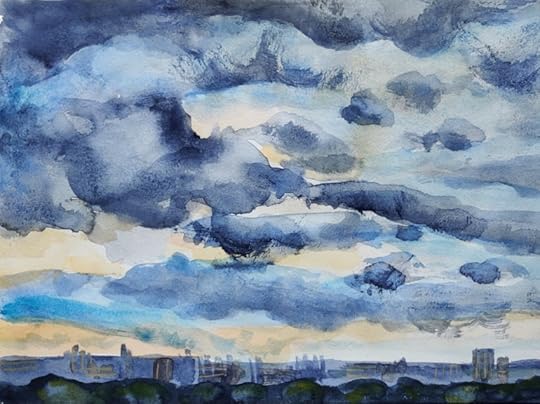
transparent watercolor in sketchbook; stormy sky just before sunset
I've never lived up in the sky before, but it feels like I do now. We have windows on two sides of our new apartment, facing north and west, and they look out on the nearly-flat northern part of the city and its suburbs, the airport to the west, and the foothills of the Laurentians in the far distance. That's the horizontal picture. But vertically, more than half of what we see outside our windows is sky.
2B pencil
One of the best features of living in a northern temperate zone (in my opinion!) is that the weather changes all the time. I've always lived in the northeast, so I thought I was used to the pattern, not only of the seasons, but the day-to-day weather, what the clouds mean, how the air feels, the visual and tactile sense of whether it's going to get colder or warmer, drier or more humid, whether precipitation is coming or not. But I realize I had no idea of just how much change there was in the sky, the clouds, the sunrises and sunsets, and the rapidity of change during a few minutes, let alone a whole day. It's completely fascinating.
medium-point fountain pen
fine-point fountain pen; fleeting early morning clouds
So I've been drawing the clouds, or starting to. I'm finding that they present particular challenges if one is trying to capture the essence of a certain sky, partly because of the constant movement and morphing of their shape and form, and partly because it's not easy to draw something that is white, on white paper: unless you indicate the sky itself in some way, all you can do is draw the sunlit edges of the clouds, the shadow sides, and their basic forms, and suggest their movement through the type of strokes you use.
HB and 2H pencil
Suggesting a summer sky isn't difficult, but studying and drawing a particular cloud or cloud formation -- getting at its identity and essence -- seems to be quite a bit more challenging. All cumulus clouds are not alike! An early-morning mackerel sky, or an ethereal formation of mare's tails, give way in minutes to other forms. Likewise, painting a sky in oil or pastel or acrylic is much easier than drawing: like a photograph, you're freezing it in time, maybe even with photos for reference, and you've got the whole range of colors at your disposal.
white charcoal pencil on toned paper
Watercolor also represents a distinct challenge. Doing a realistic painting is more similar to what I just described about painting in other media, but doing a fast sketch is really tricky, and I feel like I'm just beginning to get my feet wet. These are all early experiments from my sketchbook, between July 3 and July 29, 2022.
transparent watercolor
My final comment on this post, after a month of observation, is that we can actually see how the weather is becoming much more extreme and violent. It's been really windy, not just up high, but on the ground as well, and the pace of mostly west-to-east movement of the clouds is fast. Ominous, huge, dark grey clouds appear, usually in the west, with storms developing rapidly, and we can see them in the distance; sheets of rain falling on distant parts of the city or landscape. When thunderstorms are actually upon us, the rain lashes the windows with real force. Last Saturday there was a classic anvil cloud in the northwest that was truly apocalyptic in appearance; I'd never seen a cloud like that. That evening a home in that area was hit by lightening -- the neighbors saw an actual fireball fall from the sky and hit the roof. Another afternoon, I watched a dark funnel starting to form below a large thunderhead in the far distance and called my husband to come and look; as we watched over maybe ten minutes, it was slowly absorbed back up into the cloud, and never stretched down to the land - but it was the first time I'd ever seen that, too. Tornadoes are not a usual occurrence in Quebec, in spite of the flatness of the St. Lawrence valley, but a tornado did touch down that same evening about a hundred kilometers northwest of Montreal.
Drawing and painting the beauty of skyscapes is one thing, but I didn't expect to have a ringside seat for extreme weather. We are not suffering from the same heat levels as Europe or India or the American southwest, but our weather is definitely changing. How can anyone deny the absolute necessity of action?
transparent watercolor with touches of gouache for the city lights
July 19, 2022
test post for feedreader
this is a test of the blog's feed to see if it's showing up in the readers
July 18, 2022
What Lasts, What Sustains
A rainy evening in the clouds, the first sustained weather like this we’ve had since moving here. I like the different feeling in the apartment: quiet and closed-in, with the nearby all we can see and therefore much more prominent.
We stopped at the Jean-Talon market on our way home from my annual check-up in the eastern part of the city -- the first time I’ve seen my GP in person in more than two years -- and bought tomatoes, strawberries, a big bunch of basil, and pots of thyme and small hot peppers. Jonathan made pizza for dinner with the tomatoes and basil, and the pots are out on the balcony, getting slowly soaked with warm rain.
Coming back from central New York this time, I’ve finally realized that I always have a day or two of adjustment in each direction when I feel emotionally ragged, tearful, even angry. Arriving there, I feel overwhelmed by the house and tasks that have, suddenly, become my responsibility; I feel burdened with obligations and other people’s expectations and demands, and worried that I will fall short or be criticized -- and at first all I want to do is escape. Then the natural surroundings start to work on me; I get used to going to sleep after walking around the lake, looking at the stars, hearing the croaks of frogs, intermittent conversations of geese, and the distant lowing of cows. I get used to waking in the fresh air of early morning, fog blowing across the water, before making coffee and drinking it out on the porch or on the bench down by the shore as fish begin to rise -- and the negative feelings start to calm down. The longer I spend there, the more people I’ve come into contact with, and the more I realize we share a web of interconnections that have somehow persisted despite my long absence. Because my family’s roots there run so deep, it’s not hard for me to find ways of connecting, and when the mechanic or the truck rental guy or the clerk at the supermarket hear my name or my parents’ names, the suspicion caused by my Quebec license plate seems to be replaced by their own natural sociability, because people there tend to be very warm, friendly, and chatty. And this feels not only familiar, but refreshingly natural to me, after spending fifty years in New England and a French-speaking major city where there has been, frankly, not much of that, and seldom a ready response to my own overtures of warmth or friendliness to strangers.
Coming back here, to Montreal, the reaction tends to be a kind of wrenching sadness and grief, mainly about my father but also my attachment to that place juxtaposed with my fulfilling and happy life here, and an awareness that both marriage and family ties mean compromise -- I cannot do whatever I might want on a given day or in a given year, but have to -- if I’m to remain true to myself the values that I hold dear -- act responsibly on behalf of the people I love. And this, unfortunately, divides me. I don’t want to live in central New York full-time, nor do I want to live primarily in America again, but I do want to see and care for my father, I do feel a responsibility and love for the land that we own, I respect and care about the hardworking and straightforward people I’m meeting back where I grew up, and (perhaps this is the most significant revelation) I see much more clearly how embedded that culture and place has always been in me. Here, in my adopted country, province, and city, I am able to live more fully and freely as the person I’ve become over the years, and this is where my husband and I have built our life together and want to remain. As for community and friendship, these exist here, there, and everywhere we have lived -- and sometimes just as strongly in the strange place of online interconnection that has arisen over the past two decades, and is independent of addresses, borders, or time zones.
As I look out over the city from this high place, the clouds have risen and thinned, and lights begin to flicker on and shine in the deepening blue distance. I feel my solitude keenly and comfortably tonight, and I know that this is a quality I carry with me wherever I am, along with a natural desire for making connections, and an ease in doing so. There’s relief in recognizing that it doesn’t matter so much where I am, physically, because I’ll always be myself -- a child who grew up loving and being consoled by the solitude of nature, books, art, and music, and also learned sociability and a love of people from her father and others in a rural society that valued family, and caring about each other, above everything else.
Those qualities saved me when I left my small town and went off to find my own way in a large university, and I see them now in my father as he navigates the incredibly difficult transition from independence to a nursing home, impaired by deafness and mobility issues that would doom many people to isolation and despair. But several staff people told me how much they liked him, and I could see his efforts to connect with people, to find ways of communicating his identity and his sense of humor in spite of his frustration at his body’s failings, at finding himself stuck in that place, his grief at the loss of his partner, and all the other challenges of extreme old age.
At first I thought, “This is terrible, how difficult this is for him,” but now that I’ve thought through this last visit more deeply, it actually gives me hope that even in extreme circumstances, one’s humanity and love of others can still be expressed, and consolation found in recognized places of solace. “I can’t sing anymore,” my father said to me as he listened to a woman play the guitar and sing familiar songs -- but I saw his toe tapping, and watched his hand beat time to the rhythm -- and he had found his way to the circle of residents at the appointed time for the musical event that week. Whatever is deepest in us remains, I think, and we must not give up on it -- not now, not ever.

